- Home
- P. D. James
The Lighthouse Page 5
The Lighthouse Read online
Page 5
He had been glad to get away. The Warnborough hostesses, most of whom had been Helen’s friends, alleviated the mild boredom of provincial domesticity by the euphoria of benevolent intention. Mentally he paraphrased Jane Austen: A widower in possession of a house and a comfortable income must be in want of a wife. It was kindly meant, but since Helen’s death he had been smothered with kindness. He had come to dread the regular weekly invitations to lunch or dine. Had he really given up his job and come to this isolation merely to escape the unwelcome advances of local widows? At times of introspection, like the present, he accepted that it could have been so. The prospective successors to Helen had seemed so much of a type that it was difficult to tell them apart: his own age or a little younger, pleasant-faced and some of them pretty, kindly, well dressed and well groomed. They were lonely and assumed that he was too. At every dinner party he worried that he would forget a name, ask the same innocuous questions about children, holidays or hobbies that he had asked before, and with the same feigned interest. He could imagine his hostess’s anxious telephone calls after a carefully calculated wait: How did you get on with Rupert Maycroft? He seemed to enjoy talking to you. Has he phoned? He hadn’t phoned, but had known that one day, in a mood of quiet desperation, loneliness or weakness, he would.
His decision to give up his partnership in the practice, to move—at first temporarily—to Combe Island, had been received with the expected expressions of public regret. They had said how much he would be missed, how greatly he had been valued, but it now struck him forcibly that no one had attempted to dissuade him. He comforted himself with the thought that he had been respected—even, perhaps, a little loved by his long-standing clients, most of them inherited from his father. They had seen him as the epitome of the old-fashioned family solicitor, the confidential friend, keeper of secrets, protector and adviser. He had drawn up their wills, dealt efficiently with their property transactions, represented them before the local magistrates, all of whom he knew, when they were summoned for their petty delinquencies, mostly contested parking or speeding offences. Shoplifting by the wife of a local clergyman was the most serious case he could remember, a scandal that had provided enjoyable gossip in the parish for weeks. With his plea in mitigation the case had been compassionately dealt with by the ordering of medical reports and a moderate fine. His clients would miss him, would remember him with sentimental nostalgia, but not for long. The firm of Maycroft, Forbes and Macintosh would expand, new partners would be recruited, new premises equipped. Young Macintosh, who was due to qualify next year, had already put forward his plans. His own son, Helen’s and his only child, would thoroughly have sympathised. He now worked in London, in a City firm with over forty solicitors, a high degree of specialisation, distinguished clients and a fair share of national publicity.
He had now been on Combe for eighteen months. Cut off from the reassuring routines which had buttressed the inner self, he found himself ironically more at peace and yet more prone to inner questioning. At first the island had confused him. Like all beauty, it both solaced and disturbed. It held an extraordinary power to compel introspection, not all of it gloomy, but most of it searching enough to induce discomfort. How predictable, how comfortable his fifty-eight years had been, the over-guarded childhood, the carefully chosen prep school, the years until eighteen at a minor but respected public school, the expected upper second at Oxford. He had chosen to follow his father’s profession, not from enthusiasm or even, it now seemed, from conscious choice, but out of a vague filial respect and the knowledge that an assured job was waiting for him. His marriage had been less an affair of passion than a choice from the small coterie of suitable girls among the members of the Warnborough Tennis and Dramatic Clubs. He had never taken a really difficult decision, been tortured by a difficult choice, engaged in a dangerous sport, accomplished anything beyond the achievements of his job. Was it, he wondered, one result of being an only child, treasured and overprotected? The words from childhood most often recalled were his mother’s: “Don’t touch that, darling, it’s dangerous.” “Don’t go there, darling, you might fall.” “I shouldn’t see too much of her, darling, she’s not exactly our type.”
He thought that his first eighteen months on Combe had been reasonably successful; no one had said otherwise. But he recognised two mistakes, both new appointments, both he now knew were ill-advised. Daniel Padgett and his mother had come to the island at the end of June 2003. Padgett had written to him, although not by name, enquiring if there was a vacancy for a cook and a handyman. The then handyman was about to retire and the letter, well written, persuasive and accompanied by a reference, had seemed opportune. No cook was required, but Mrs. Plunkett had hinted that extra help would be welcome. It had been a mistake. Mrs. Padgett was already a very sick woman with only months to live, months which she had apparently been determined to spend on Combe Island, seen from the shore as a child during visits to Pentworthy and which had become a fantasy Shangri-la. Most of Padgett’s time, helped by Joanna Staveley and occasionally by Mrs. Burbridge, the housekeeper, had been spent looking after her. Neither had complained, but Maycroft knew that they were paying for his folly. Dan Padgett was an excellent handyman but he managed, although wordlessly, to make it plain that he disliked being on the island. Maycroft had overheard Mrs. Burbridge speaking to Mrs. Plunkett. “Of course he’s not really an islander and, now that his mother’s gone, I don’t think he’ll be here much longer.” He’s not an islander was on Combe a damning indictment.
And then there was eighteen-year-old Millie Tranter. He had taken her in because Jago, the boatman, had found her homeless and begging in Pentworthy and had phoned him to ask if she could come back on the launch until arrangements could be made for her. Apparently it was either that, leaving her to be picked up by the first predatory male or handing her over to the police. Millie had arrived and been given a room in the stable block and a job helping Mrs. Burbridge with the linen and Mrs. Plunkett in the kitchen. That at least was working well, but Millie and her future remained a nagging anxiety. Children were no longer allowed on the island and Millie, although in law an adult, had the unpredictability and waywardness of a child. She couldn’t remain on Combe indefinitely.
Maycroft looked across at his colleague, at the long-boned sensitive face, the pale skin which seemed impervious to sun and wind, the lock of dark hair falling across the forehead. It was a scholar’s face. Boyde had been some months on the island when Maycroft arrived, he too a fugitive from life. Boyde had been brought to Combe Island through the auspices of Mrs. Evelyn Burbridge; as the widow of a vicar, she still had connections in the clerical world. He had never questioned either of them directly but knew, as he supposed most people on the island knew, that Boyde, an Anglican priest, had resigned from his living because of either a loss of faith or his alcoholism, or perhaps a mixture of both. Maycroft felt himself incapable of understanding either predicament. For him wine had always been a pleasure, not a necessity, and his former Sunday attendance at church with Helen had been a weekly affirmation of his Englishness and of acceptable behaviour, a mildly agreeable obligation devoid of religious fervour. His parents had distrusted religious enthusiasm, and any wild clerical innovations which threatened their comfortable orthodoxy had been summed up by his mother: “We’re C of E, darling, we don’t do that sort of thing.” He found it odd that Boyde should resign because of recently acquired doubts about dogma; a loss of faith in dogma was an occupational hazard for priests of the Church of England, judging from the public utterances of some of the bishops. But the church’s loss had been his gain. He couldn’t now envisage the job at Combe without Adrian Boyde at the other desk.
Guiltily he realised that he must have been staring out of the window for over five minutes. Resolutely he turned eyes and mind to the work in hand. But his good intentions were frustrated. There was a bang on the door and Millie Tranter bounced in. She came to the office seldom but always arrived in the same way, seeming to
materialise on his side of the door before his ears caught her knock.
She said, with no attempt to hide her excitement, “There’s big trouble down at the harbour, Mr. Maycroft. Mr. Oliver said you was to come at once. He’s really wild! It’s something to do with Dan losing his blood sample overboard.”
Millie seemed impervious to cold. Now she was celebrating the warm day by wearing her heavily buckled jeans low on her hips with a short tee-shirt barely covering the childlike breasts. Her midriff was bare and there was a gold stud in the umbilicus. Maycroft thought that perhaps he had better have a word with Mrs. Burbridge about Millie’s clothes. Admittedly none of the visitors was likely to see much of her, clad or unclad, but he couldn’t believe that his predecessor would have tolerated the sight of Millie’s naked stomach.
Now he said, “What were you doing at the harbour, Millie? Aren’t you supposed to be helping Mrs. Burbridge with the linen?”
“Done that, haven’t I? She said I could bunk off. I went to help Jago unload.”
“Jago’s perfectly competent to unload himself. I think you’d better go back to Mrs. Burbridge, Millie. There must be something useful you can do.”
Millie made a pantomime of casting her eyes upwards, but went without argument. Maycroft said, “Why do I always talk to that child like a schoolmaster? Do you suppose that I might understand her better if I’d had a daughter? Do you think she can possibly be happy here?”
Boyde looked up and smiled. “I shouldn’t worry, Rupert. Mrs. Burbridge finds her useful and they get on well. It’s a pleasure to have someone young about. When Millie’s had enough of Combe she’ll be off.”
“I suppose Jago is the attraction. She’s always at Harbour Cottage. I hope she doesn’t cause complications there. He really is indispensable.”
“I think Jago can cope with adolescent passion. If you’re worried about possible trouble if Jago seduces her—or she him, which is more likely—don’t. It won’t happen.”
“Won’t it?”
Adrian said gently, “No, Rupert, it won’t.”
“Oh well, I suppose that’s a relief. I don’t think I was really worried. I doubted whether Jago would have the time or the energy. Still, sex is something most people find time and energy for.”
Adrian said, “Shall I go down to the harbour?”
“No, no. I’d better go.”
Boyde was the last one who should be asked to confront Oliver. Maycroft felt a second’s irritation that the suggestion should have been made.
The walk to the harbour was one of his favourites. Usually it was with an uplifting of his spirits that he crossed the forecourt of the house and took the narrow pebble-strewn path towards the steps which led down the cliff to the quay. And now the harbour lay beneath him like a coloured picture from a storybook: the two stunted towers topped with lights on each side of the narrow entrance, Jago Tamlyn’s neat cottage with the row of large terra-cotta pots in which he would plant his summer geraniums, the coiled ropes and the spotless bollards, the tranquil inner water and, beyond the harbour mouth, the restless sea and the distant counter-flow of the riptide. Sometimes he would leave his desk and walk to the harbour when the launch was due, silently watching for its appearance with the atavistic pleasure of islanders down the ages awaiting the arrival of a long-expected ship. But now he walked slowly down the final steps, aware that his approach was being studied.
At the quayside Oliver was standing rigid with fury. Jago, disregarding him, was busying himself with the unloading. Padgett, ashen-faced, was pressed against the wall of the cabin as if facing a firing squad.
Maycroft said, “Is anything wrong?”
Silly question. The peremptory silence, Oliver’s white face, implied a more-than-trifling misdemeanour on Padgett’s part.
Oliver said, “Well, tell him, one of you! Don’t just stand there, tell him.”
Jago’s voice was expressionless. “Mrs. Burbridge’s library books, some shoes and handbags that belonged to Mrs. Padgett and which Dan was taking to the Oxfam shop, and Mr. Oliver’s blood sample have been lost overboard.”
Oliver’s voice was controlled but staccato with outrage. “Note the order. Mrs. Burbridge’s library books—obviously an irreparable loss to the local public library. Some unfortunate pensioner looking for a pair of cheap shoes at the charity shop will be disappointed. The fact that I shall have to give blood again is of no importance compared with those major catastrophes!”
Jago was beginning to speak, but Oliver pointed to Padgett. “Let him answer. He’s not a child. It was his fault.”
Padgett made an attempt at dignity. He said, “I had the packet with the blood sample and the other things in a canvas bag slung over my shoulder. I was leaning over the rail looking at the water and the bag slipped off.”
Maycroft turned to Jago. “Didn’t you stop the launch? Couldn’t you get a billhook to it?”
“It was the shoes, Mr. Maycroft. They were heavy and they sunk quickly. I heard Dan shout out, but it was too late.”
Oliver said, “I want to speak to you, Maycroft. Now, please, and in the office.”
Maycroft turned to Padgett. “I’ll talk to you later.”
That schoolmaster’s voice again. He was about to add, Don’t worry about it too much, but knew that the comfort implied in the words would only antagonise Oliver further. The look of terror on Padgett’s face worried him. Surely it was disproportionate to the crime. The library books would be paid for; the loss of the shoes and handbags hardly warranted more than a sentimental regret that could only be felt by Padgett himself. Oliver might be one of those unfortunates with a pathological hatred of needles, but if so, why had he asked to have blood taken on the island? A mainland hospital would probably have had the more modern thumb-pricking method of taking blood. The thought brought back memory of the blood tests on his wife some four years earlier, when she had been treated for a deep-vein thrombosis following a long flight. The memory, coming at such an incongruous moment, brought no comfort. As he confronted Oliver’s white and rigid face, on which the jutting bones seemed to have solidified into stone, the memory of their joint visits sitting together in the hospital outpatients department only reinforced his sense of inadequacy. Helen would have said, Stand up to the man. You’re in charge. Don’t let him bully you. There’s nothing seriously wrong with him. No harm’s been done. Giving another sample of blood isn’t going to kill him. So why at this moment did he have an irrational conviction that somehow it could?
They made their way up the pathway to the house in silence, Maycroft accommodating his strides to Oliver’s pace. He had last seen the man only two days previously, when there had been the expected encounter in his office about Atlantic Cottage. Now, glancing down at him, at the fine head which reached only to Maycroft’s shoulder, the strong white hair lifted by the breeze, he saw with reluctant compassion that even in that short time Oliver seemed visibly to have aged. Something—was it confidence, arrogance, hope?—had seeped out of him. He was now toiling painfully, that much-photographed head looking incongruously heavy for the short, enfeebled body. What was wrong with the man? He was only sixty-eight, hardly more than late middle-aged by modern reckoning, but he looked over eighty.
In the study Boyde got to his feet and, at a nod from Maycroft, silently left. Oliver, refusing a chair, supported himself by clasping its back and confronting Maycroft across the desk. His voice was in control, the words calmly delivered.
“I have only two things to say and I shall be brief. In my will I have divided what the Treasury is graciously pleased to leave me equally between my daughter and the Combe Island Trust. I have no other dependants and no charitable interest, or indeed any desire to relieve the State of its obligations towards the less fortunate. I was born on this island and I believe in what it does—or in what it used to do. Unless I can be given an assurance that I shall be welcome here as often as I choose to come, and that I shall be provided with the accommodation I need for my work,
I shall change my will.”
Maycroft said, “Isn’t that rather a drastic response to what was clearly an accident?”
“It was not an accident. He did it on purpose.”
“Surely not. Why should he? He was careless and stupid but it wasn’t meant.”
“I assure you it was meant. Padgett should never have been allowed to come here and to bring his mother with him. She was obviously dying at the time, and he misled you about her condition and her competence to work. But I’m not here to discuss Padgett or to teach you how to do your job. I’ve said what I wanted to say. Unless things change here, my will shall be altered as soon as I return to the mainland.”
Maycroft said carefully, “That, of course, is your decision. I can only say I’m sorry if you feel we have failed you. You have the right to come whenever you choose, that is clear under the deed of the Trust. Anyone born on the island has that right, and as far as we know you’re the only living person to whom that applies. Emily Holcombe has a moral right to Atlantic Cottage. If she consents to move, then the cottage will be yours.”

 The Skull Beneath the Skin
The Skull Beneath the Skin A Taste for Death
A Taste for Death The Children of Men
The Children of Men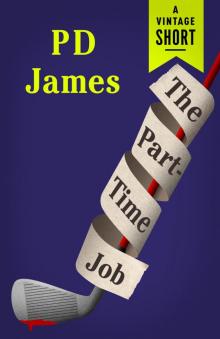 The Part-Time Job
The Part-Time Job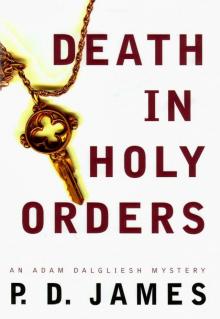 Death in Holy Orders
Death in Holy Orders The Victim
The Victim Shroud for a Nightingale
Shroud for a Nightingale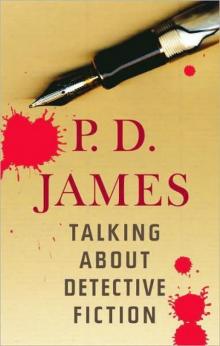 Talking about Detective Fiction
Talking about Detective Fiction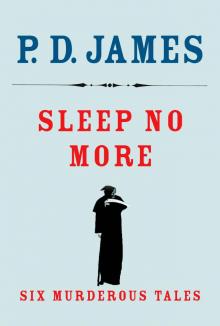 Sleep No More
Sleep No More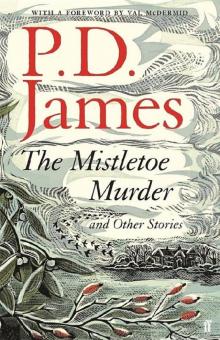 The Mistletoe Murder and Other Stories
The Mistletoe Murder and Other Stories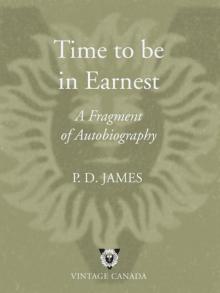 Time to Be in Earnest
Time to Be in Earnest Original Sin
Original Sin A Mind to Murder
A Mind to Murder Cover Her Face
Cover Her Face Innocent Blood
Innocent Blood Devices and Desires
Devices and Desires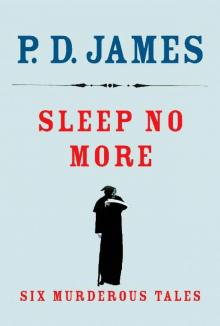 Sleep No More: Six Murderous Tales
Sleep No More: Six Murderous Tales Death Comes to Pemberley
Death Comes to Pemberley The Mistletoe Murder
The Mistletoe Murder Death of an Expert Witness
Death of an Expert Witness The Private Patient
The Private Patient The Black Tower
The Black Tower Devices & Desires - Dalgleish 08
Devices & Desires - Dalgleish 08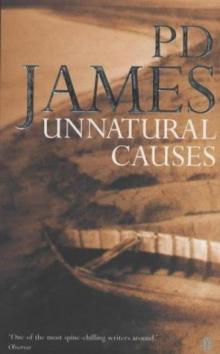 Unnatural Causes
Unnatural Causes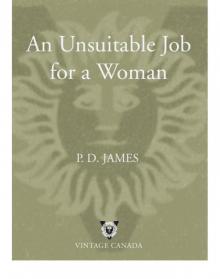 An Unsuitable Job for a Woman
An Unsuitable Job for a Woman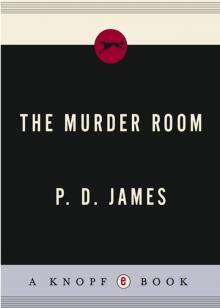 The Murder Room
The Murder Room A Certain Justice
A Certain Justice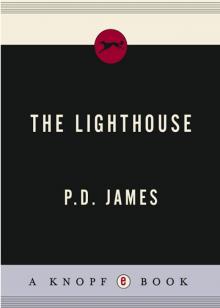 The Lighthouse
The Lighthouse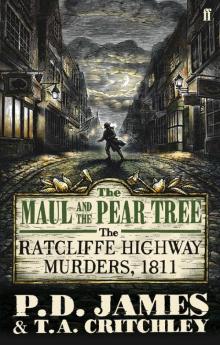 The Maul and the Pear Tree
The Maul and the Pear Tree